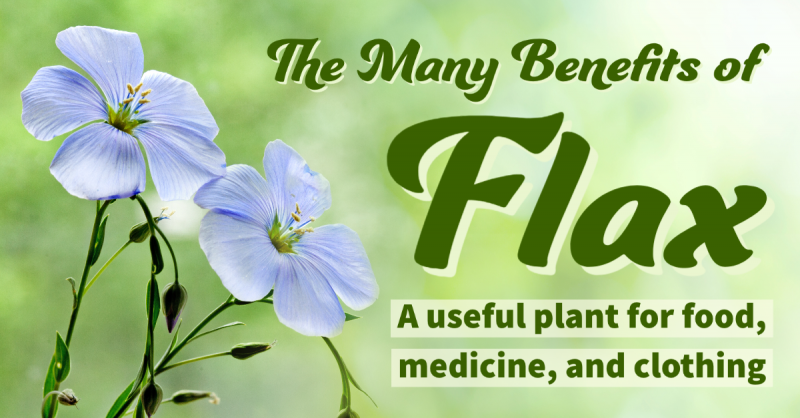
Flax (Linum usitatissimum) is a beautiful plant, with tall, thin stalks that bear delicate blue to violet flowers. A field of flax in bloom is an amazing sight. But flax is also an extremely useful plant, which has played a variety of roles in many cultures for about 5,000 years.
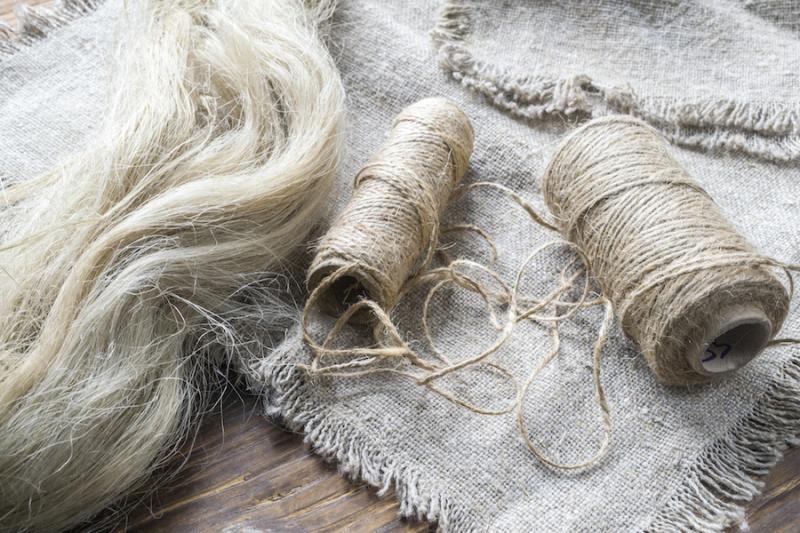 Flax stalks contain a fiber that is used to make linen. Linen is strong, absorbent, and dries faster than cotton, which allowed for the creation of comfortable clothes for hot weather. Linen is mentioned in the Bible as a source of clothing for the high priests and as the material Joseph of Arimathea used to wrap the body of Jesus following his crucifixion.
Flax stalks contain a fiber that is used to make linen. Linen is strong, absorbent, and dries faster than cotton, which allowed for the creation of comfortable clothes for hot weather. Linen is mentioned in the Bible as a source of clothing for the high priests and as the material Joseph of Arimathea used to wrap the body of Jesus following his crucifixion.
The seeds are the source of linseed oil, which has also been used for numerous purposes for thousands of years. It was burned in lamps, but also has the capacity to dry and leave behind a coating. Thus, linseed oil has been used to create paints, varnishes, and putty. Oh, and here’s an interesting tidbit, linseed oil has also been used to manufacture floor coverings, hence the term linoleum.
Flax seeds have an equally long and illustrious history in food and medicine. In antiquity, Hippocrates, considered the father of modern western medicine, recommended their use for inflammation of the mucous membranes. And in the 20th century Mahatma Gandhi was quoted as saying, ”Wherever flax seeds become a regular food item among the people, there will be better health.”
Essential Fatty Acids
Today, we know that flax seeds are one of the best sources of both omega-3 and omega-6 fatty acids essential fatty acids. It contains the short-chain versions of these fatty acids, alpha-linolenic acid (omega-3) and linoleic acid (omega-6). It’s one of the best plant sources of alpha-linolenic acid, which are converted in healthy people into the longer chain forms our bodies need, EPA and DHA. The value of omega-3 fatty acids in reducing inflammation is well-established, which explains why Hippocrates found it useful for inflammatory diseases.
Flaxseed oil contains omega-6 and omega-3 in the proper balance, making it one of the best oils with which to supplement the diet to ensure adequate intake of EFAs. It can be taken in capsules or used in place of other oils on salads or in soups. Don't use it to fry with because the heat destroys its healthy benefits. It also goes rancid quite rapidly, so the best way to use it is to consume the fresh seeds, rather than the oil.
Better Butter
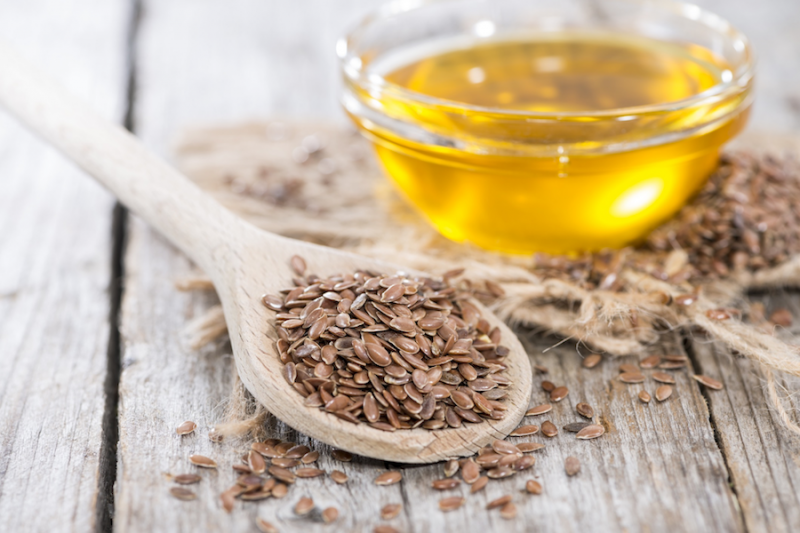 In the past I've used flaxseed oil to make a healthier soft spread butter. It is an idea I got from Laurel’s Kitchen, a vegetarian cookbook. In it Laurel suggests a blend of butter and olive oil, but, I decided to use flaxseed oil so I’d get essential fatty acids from flax seeds along with the nutrients in the organic-grass-fed butter (vitamins A&D, short-chain saturated fats, and possibly vitamin K2).
In the past I've used flaxseed oil to make a healthier soft spread butter. It is an idea I got from Laurel’s Kitchen, a vegetarian cookbook. In it Laurel suggests a blend of butter and olive oil, but, I decided to use flaxseed oil so I’d get essential fatty acids from flax seeds along with the nutrients in the organic-grass-fed butter (vitamins A&D, short-chain saturated fats, and possibly vitamin K2).
This spreadable better butter is very simple to make, just let two sticks of butter soften to room temperature and then I blend it with 1/2 to 1 cup of flaxseed oil until smooth before refrigerating. Exactly how much flaxseed oil you use depends on how soft you want the spread to be and how much you enjoy the flavor. I really enjoy the flavor the flaxseed oil adds to the butter. It has a pleasant "nutty" or "fishy" flavor.
You can also use flaxseed oil to make salad dressings, or in place of olive oil in hummus or other foods that aren't cooked. Flaxseed oil can be mixed half and half with real maple syrup to use over pancakes and waffles. You can also use it straight on baked potatoes or in place of butter in your oatmeal.
Flax Seeds
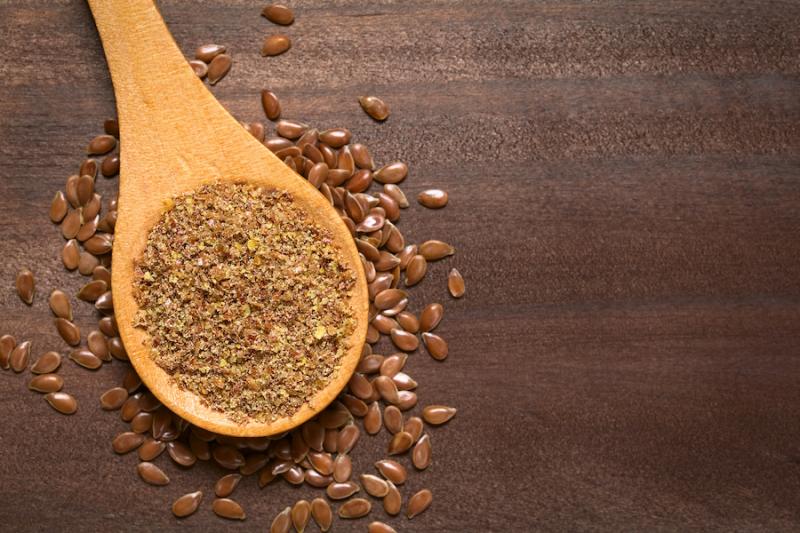 Flax seeds themselves are not only a source of good fats, they’re also mucilaginous and lubricating. I find they make an excellent remedy for constipation where the stools tend to be dry. Here, I use freshly ground flax seeds and mix them half and half with psyllium to make a bulk laxative blend. If you want to tone up the colon, you can mix equal parts freshly ground flax seeds, psyllium, and Triphala, a blend of three fruits in Ayurvedic medicine that act as a gentle laxative and bowel tonic. You could also substitute slippery elm or marshmallow powder for the psyllium if you have a sensitive colon. Make only small batches and store them in the refrigerator to help keep the oils in the ground flax seeds from going rancid.
Flax seeds themselves are not only a source of good fats, they’re also mucilaginous and lubricating. I find they make an excellent remedy for constipation where the stools tend to be dry. Here, I use freshly ground flax seeds and mix them half and half with psyllium to make a bulk laxative blend. If you want to tone up the colon, you can mix equal parts freshly ground flax seeds, psyllium, and Triphala, a blend of three fruits in Ayurvedic medicine that act as a gentle laxative and bowel tonic. You could also substitute slippery elm or marshmallow powder for the psyllium if you have a sensitive colon. Make only small batches and store them in the refrigerator to help keep the oils in the ground flax seeds from going rancid.
Put a spoonful of the fiber mixture in a glass of water or juice (apple juice is my preference), then quickly mix it and drink it. If you let it sit too long the mixture will gel and be impossible to drink.
Internally flax seeds can help to moisten the lungs when there is a dry cough, soothe intestinal inflammation, and moisten dry, irritated skin. You can also use crushed flaxseed meal for poultices, which can be used on burns, scars, dry itchy skin, dry eczema, abscesses, boils, strains, and sprains. You can also use a poultice of flax seeds to help keep tendons and muscles flexible.
Flax lignans
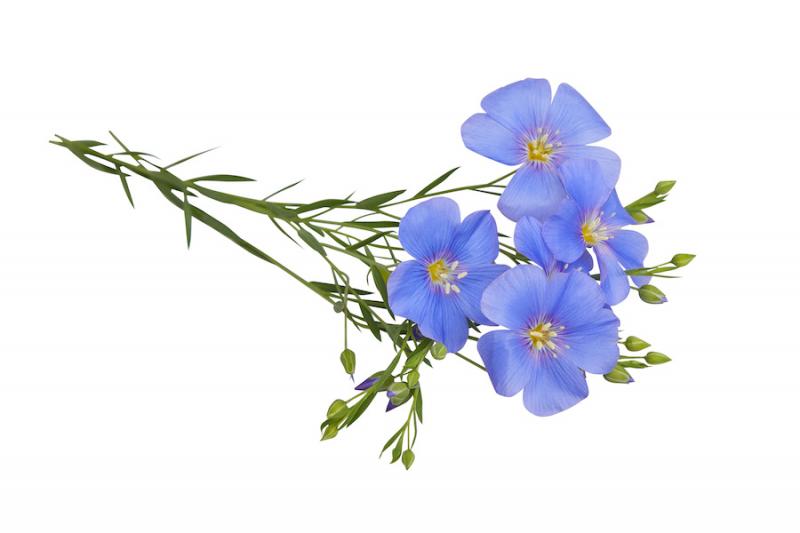 There are 27 different lignans in flax, one of the main ones being secoisolariciresinol diglycoside (SDG). Research suggests that SDG lignan is a powerful antioxidant.
There are 27 different lignans in flax, one of the main ones being secoisolariciresinol diglycoside (SDG). Research suggests that SDG lignan is a powerful antioxidant.
Research also suggests that flax lignans are powerful phytoestrogens that can block the effects of xenoestrogens and reduce the risk of breast cancer and other estrogen-dependent cancers. Researchers have found populations that consume high levels of lignans have lower rates of breast cancer and colon cancer, apparently because of the lignans’ anti-estrogenic effect.
If you're concerned about the estrogenic effect of flax lignans you might want to avoid supplementing with flax seeds or flaxseed oil. Despite enjoying my better butter I decided to go back to using olive oil to avoid the lignans in the flaxseed oil. At my age, I want to avoid exposure to phytoestrogens as they can reduce testosterone’s effectiveness in men.
Plants are useful to us in so many ways and flax is one example of a plant that’s both a food and a medicine, as well as possessing wonderful utilitarian uses. I hope this article has helped you appreciate the amazing benefits of the flax plant.
Steven's Articles
-

-
The Evidence for Berberine
A yellow alkaloid found in traditional infection-fighting…
-

-
The Sensible Use of Caffeinated Herbs
Kola nuts, guarana, and yerba mate and other herbs…
-

-
The Health Benefits and Problems with Coffee
This popular caffeinated beverage can be beneficial…
October
-

-
Understanding Caffeine & Cellular Adaptation
Preserving the power of caffeine's buzz and the…
September
-

-
Horseradish
A pungent spice for aiding protein metabolism…
-

-
Banaba or Crepe Myrtle
A beautiful tree from Southeast Asia whose leaves…
August
-

-
Monkeyflowers
Flower essences to help see ourselves more clearly…
-

-
Mariposa Lilies
Strengthening the bond between mother and child…
-

-
The Noble Bay Leaf
A common kitchen herb for aiding digestion and…
-

-
Epimedium: Horny Goat Weed
A circulatory stimulant and kidney yang tonic…
July
-

-
The Medicinal and Nutritional Benefits of Apricots
A nutritious fruit and valuable medicinal seed for coughs
-

-
Dogwoods
Asian dogwood is used to stop excessive discharge,…
June
-

-
Neem: The Village Pharmacy
A popular Ayurvedic remedy for dental and immune…
-

-
Spilanthes: The Toothache Plant
A traditional remedy for teeth and gums, as well…
-

-
Forsythia
An anti-inflammatory, fever-reducing, and infection fighting herb

